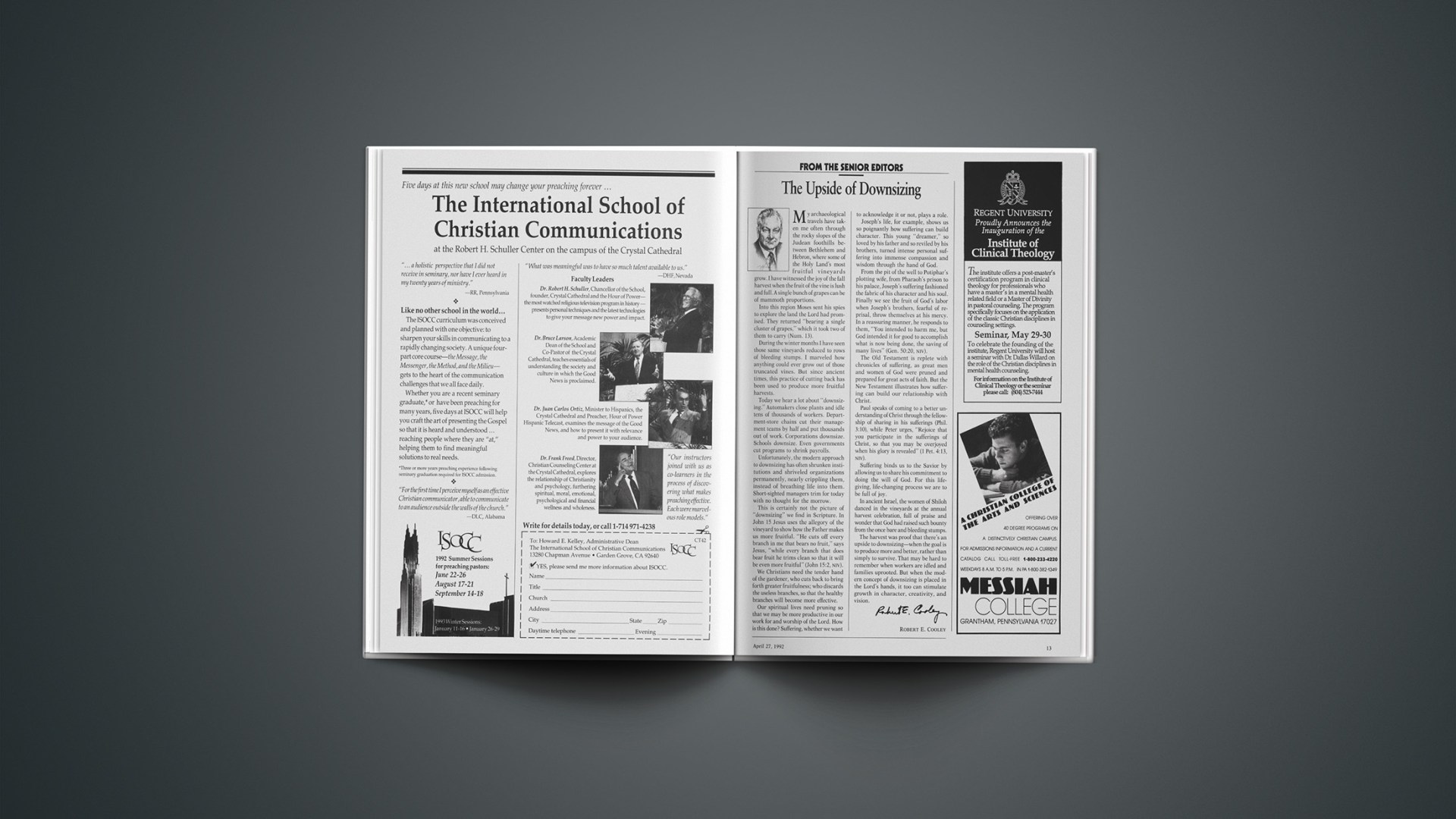My archaeological travels have taken me often through the rocky slopes of the Judean foothills between Bethlehem and Hebron, where some of the Holy Land’s most fruitful vineyards grow. I have witnessed the joy of the fall harvest when the fruit of the vine is lush and full. A single bunch of grapes can be of mammoth proportions.
Into this region Moses sent his spies to explore the land the Lord had promised. They returned “bearing a single cluster of grapes,” which it took two of them to carry (Num. 13).
During the winter months I have seen those same vineyards reduced to rows of bleeding stumps. I marveled how anything could ever grow out of those truncated vines. But since ancient times, this practice of cutting back has been used to produce more fruitful harvests.
Today we hear a lot about “downsizing.” Automakers close plants and idle tens of thousands of workers. Department-store chains cut their management teams by half and put thousands out of work. Corporations downsize. Schools downsize. Even governments cut programs to shrink payrolls.
Unfortunately, the modern approach to downsizing has often shrunken institutions and shriveled organizations permanently, nearly crippling them, instead of breathing life into them. Short-sighted managers trim for today with no thought for the morrow.
This is certainly not the picture of “downsizing” we find in Scripture. In John 15 Jesus uses the allegory of the vineyard to show how the Father makes us more fruitful. “He cuts off every branch in me that bears no fruit,” says Jesus, “while every branch that does bear fruit he trims clean so that it will be even more fruitful” (John 15:2, NIV).
We Christians need the tender hand of the gardener, who cuts back to bring forth greater fruitfulness; who discards the useless branches, so that the healthy branches will become more effective.
Our spiritual lives need pruning so that we may be more productive in our work for and worship of the Lord. How is this done? Suffering, whether we want to acknowledge it or not, plays a role.
Joseph’s life, for example, shows us so poignantly how suffering can build character. This young “dreamer,” so loved by his father and so reviled by his brothers, turned intense personal suffering into immense compassion and wisdom through the hand of God.
From the pit of the well to Potiphar’s plotting wife, from Pharaoh’s prison to his palace, Joseph’s suffering fashioned the fabric of his character and his soul. Finally we see the fruit of God’s labor when Joseph’s brothers, fearful of reprisal, throw themselves at his mercy. In a reassuring manner, he responds to them, “You intended to harm me, but God intended it for good to accomplish what is now being done, the saving of many lives” (Gen. 50:20, NIV).
The Old Testament is replete with chronicles of suffering, as great men and women of God were pruned and prepared for great acts of faith. But the New Testament illustrates how suffering can build our relationship with Christ.
Paul speaks of coming to a better understanding of Christ through the fellowship of sharing in his sufferings (Phil. 3:10), while Peter urges, “Rejoice that you participate in the sufferings of Christ, so that you may be overjoyed when his glory is revealed” (1 Pet. 4:13, NIV).
Suffering binds us to the Savior by allowing us to share his commitment to doing the will of God. For this life giving, life-changing process we are to be full of joy.
In ancient Israel, the women of Shiloh danced in the vineyards at the annual harvest celebration, full of praise and wonder that God had raised such bounty from the once bare and bleeding stumps.
The harvest was proof that there’s an upside to downsizing—when the goal is to produce more and better, rather than simply to survive. That may be hard to remember when workers are idled and families uprooted. But when the modern concept of downsizing is placed in the Lord’s hands, it too can stimulate growth in character, creativity, and vision.










